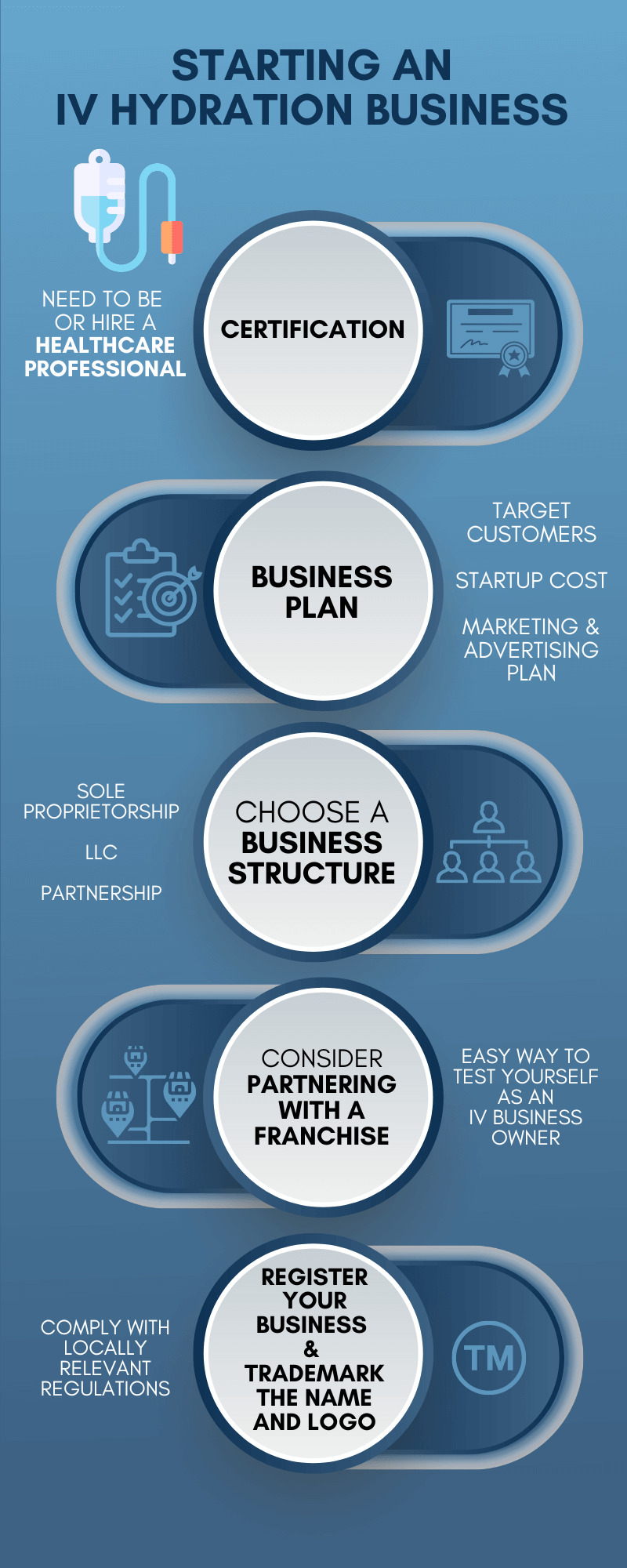Quick Guide
- Be trained and certified as a healthcare professional who can administer IV treatments.
- Create a business plan, including details about who your target customers are, how much it will cost to start and run the business, and how you plan to market and advertise your services.
- Come up with a name and logo for your new business.
- Decide on the legal structure of your new business (partnership, LLC, etc.).
- Find an office space that has adequate room for supplies as well as team members.
- Register your business, complying with local and state laws.
What Is IV Hydration Therapy?
The first step is to understand what it is that you’re selling. In general, IV therapy (intravenous therapy) involves filling a bag with a fluid (e.g., a solution of vitamins and minerals), and then administering it into your customer’s bloodstream through a needle. This process delivers nutrients directly into the bloodstream and can be used for health and wellness purposes.
What are some reasons why people seek out IV hydration infusions?
- To boost energy levels.
- To recover from illness or injury.
- To alleviate symptoms of hangovers.
- To promote weight loss.
So if you’re interested in how to start an IV hydration business, you need a thorough understanding of this therapy and its potential.
Did You Know… 🔍
Intravenous technology wasn’t widely available until the 1950s. But the first documented attempt at IV therapy was performed in 1492 on Pope Innocent VIII in Rome. Unfortunately, it resulted in the death of the Pope and his blood donors. It was only in the 1820s that the first successful blood transfusions were performed. A few years later, 8 cholera patients were successfully revived by intravenous saline.
How to Start an IV Hydration Business? Step-by-Step Guide
Starting a business of any kind generally includes the same steps. Here’s a detailed breakdown of the process for IV therapy specifically.
Get Certified
If you’re interested in how to start an IV hydration business, you should be trained and certified as a healthcare professional who can administer IV treatments first. Have you completed a relevant medical degree or certification program, gained relevant work experience, and passed any required exams or certifications?
You can also hire a nurse or other healthcare practitioner who is certified in IV drips, if you’re unable to complete this step yourself. But check with your local and state laws to see if you’re allowed to own a practice as a non-medical professional.
Create a Business Plan
Next, create a business plan for your new IV hydration business. Describe in detail:
- who your target customers are;
- how much it will cost to start and run the business;
- how you plan to market and advertise your services; and
- provide any other information that potential investors or lenders may need to know.
Figure Out Your Business Name and Logo
Brainstorm potential names and designs, work with a graphic designer to create a professional logo and branding materials, and file for official trademark protection for your business name and logo. How to start an IV hydration business? Keep reading for more steps.
Consider Your Business Structure
You’ll also need to decide on the legal structure of your new business – partnership, LLC, sole proprietorship, or corporation? Each type has its own pros and cons and requirements, so do your research and choose the right one for your business.
Choose Your Location
Now, start looking for a suitable location for your new business. Find an office space that has adequate room for your team, as well as any equipment or supplies that you’ll need.
Consider Franchise
If you’re looking for a more proven model to follow and are interested in working with a larger company, consider partnering with a franchise. This will involve some initial investment on your part, but it can be a convenient way to achieve your goals.
Register Your Business
Register your IV therapy business with local, state, or federal agencies who have jurisdiction over healthcare businesses in your area. This more-or-less means registering as a medical professional, obtaining licenses and permits, and complying with any other relevant regulations or requirements.

You Have a Business Plan, a Business Name – Now Start Making Money!
Now you’re ready – you know how to start an IV hydration business! With a little planning, you can offer clients the health benefits they’re looking for. Good luck!
FAQs About IV Hydration Businesses

Is an IV Therapy Business Profitable?
Yes, it is! If you charge $200 for an IV hydration session and schedule 5 sessions per day, you’ll make $260,000 in annual revenue. The average margin is 35%, which means you’ll make $91,000 in profit. Some businesses provide more expensive services, such as vitamin IV drips, and can double or triple their profits.
Can an RN Start an IV Hydration Business in Texas?
There are strict regulations about who can practice medicine in Texas. Only a licensed physician can own an IV therapy practice. Registered nurses (RNs) can be involved in the non-medical aspects of the business, such as management (i.e., owning a Management Services Organization). They can also be employed by the practice and administer intravenous fluids.
Who Is the Target Market for IV Hydration?
From those seeking an anti-aging boost to individuals recovering from hangovers and cancer treatments, IV hydration therapy provides a targeted solution for people aged 18–60 looking for results. Whether it’s rehydrating after jet lag or providing immune support, this form of treatment is quickly becoming the go-to option for many dealing with various illnesses and conditions.
Can LPN Do IV Hydration?
In most states, licensed practical nurses (LPNs) can administer intravenous fluids under the supervision of a registered nurse (RN). They need to have adequate experience and annual documented education in order to do the practice. LPNs can also assist with patient care during and after IV hydration treatment.
Can an RN Start an IV Hydration Business in Arizona?
There is no law prohibiting registered nurses from owning an IV therapy practice in Arizona. In fact, they’ve been known to deliver at-home services to patients, which isn’t regulated by law.













